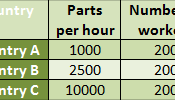Introduction
It is an accepted fact of life that no nation can achieve a completely independent existence because of the differences in factor endowment of nations. The global economy is an epitome of interdependence characterized by a complex flow of goods and products between countries, normally referred to an international trade. International trade involves voluntary exchange of goods, services, assets, or money between residents of two different countries or between different countries. Across the ages, businesses seeking markets have looked to trade beyond their home county. Growth in international trade has been a major contributor to the rise of the major industrialized countries, stretching back to the industrial revolution. International trade provides the opportunity for less endowed countries to acquire goods and products that are either not available or in short supply within the local economy.
From the history of international trade, there are many different models and theories of international trade as following:
Mercantilism
The earliest attempt to explain the role of international trade in a nation's economy was dubbed mercantilism.
The basic tenets of mercantilism were founded on the belief that there is a correlation between national wealth, power and security. Mercantilism trade policy was fundamentally nationalistic in orientation with the primary aim of accumulating the wealth and power of the state by encouraging exports and discouraging imports. In order to export more than they imported, governments established monopolies over their countries' trade. Restrictions were imposed on most imports, and many exports received subsidies. The principle of mercantilism is based on the belief that one nation can increase its trade only at some cost to other nations. It is the role of governments to control international trade by encouraging the exports of finished goods and imports of raw materials, and prohibiting the importation of finished goods. According to...


